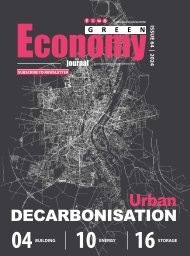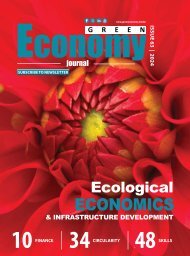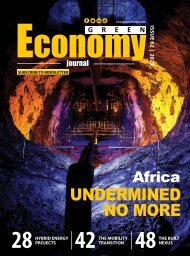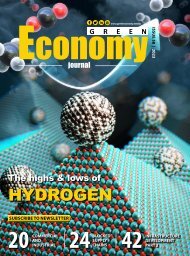Green Economy Journal Issue 60
You also want an ePaper? Increase the reach of your titles
YUMPU automatically turns print PDFs into web optimized ePapers that Google loves.
PRODUCTION<br />
ECO-INNOVATION<br />
Invest in<br />
for textile companies<br />
Industrial Efficiency<br />
• Long term sustainability through resource savings<br />
The textile industry is a significant global commodity that generates<br />
job opportunities and contributes to the economy. However, its low<br />
reuse and recycling rates raise concerns about resource waste and<br />
carbon emissions.<br />
BY LESEGO HLALETHWA, NCPC-SA<br />
Lee-Hendor Ruiters,<br />
Innovation and Strategy<br />
Manager, NCPC-SA.<br />
THA 23-2023<br />
• Economic growth<br />
• Environmental compliance<br />
• Contributes to social development<br />
Services include:<br />
<strong>Green</strong> skills development<br />
Industry and sector knowledge sharing<br />
Company technical support<br />
National Cleaner<br />
Production Centre<br />
South Africa<br />
A national industrial<br />
support programme that<br />
partners with industry to<br />
drive the transition towards<br />
a green economy and<br />
save money.<br />
Contact us for a free assessment<br />
www.ncpc.co.za<br />
ncpc@csir.co.za<br />
Funded by the dtic, hosted by the CSIR<br />
To strengthen the South African textile sector, promote<br />
circularity, sustainability and enhance competitiveness, the<br />
United Nations Environment Programme (UNEP), the National<br />
Cleaner Production Centre South Africa (NCPC-SA) and the Centre<br />
for African Resource Efficiency and Sustainability (CARES) have<br />
collaborated on the implementation of a three-year project funded<br />
by the European Union – the Innovative Business Practices and<br />
Economic Models in the Textile Value Chain or InTex.<br />
In July 2023, the InTex Project implementing partners, the NCPC-SA<br />
and CARES, hosted roadshows across two provinces to facilitate a<br />
dialogue between the project steering committee including the<br />
Department of Science and Innovation, Department of Forestry,<br />
Fisheries and Environment, provincial and local government as<br />
well as government stakeholders and participating small and<br />
medium enterprises (SMEs). The roadshows resulted in numerous<br />
resolutions based on the challenges shared by SMEs. While the list<br />
is not exhaustive, the SMEs raised the following:<br />
• A need for third-party verification systems or a form of certification<br />
to verify the implementation of processes in sustainable innovation.<br />
• Municipalities’ availability to offer support to the textile and<br />
clothing industry as well as access to a contact person to provide<br />
such support.<br />
Eco-innovation can help<br />
companies access new<br />
and expanding markets.<br />
• Solutions to dispose of synthetic fibre waste in an environmentally<br />
friendly manner.<br />
• A need to address prevalent job losses in the sector due to factors<br />
such as the energy crisis and natural disasters.<br />
• Prioritising skills development for the sector.<br />
• Prioritising access to finance for circular economy and other<br />
green projects, as well as incentives for their implementation.<br />
In the resolutions, access to funding proved the most eminent. The<br />
NCPC-SA and CARES have already started to roll out interventions to<br />
address this. They recently co-hosted a green finance workshop. The<br />
NCPC-SA manager for strategy and innovation, Lee-Hendor Ruiters,<br />
says: “Having previously organised green finance workshops for<br />
various industries, we recognised the need to tailor our approach to<br />
cater specifically to the textile sector.”<br />
The green finance workshop was presented by financiers from<br />
renowned commercial banks, development institutions and the<br />
Department of Trade, Industry and Competition. The primary objective<br />
was to unpack the various finance mechanisms that support the<br />
implementation of green projects and explain the different government<br />
incentives available to support the sector.<br />
“One of the things that makes the green finance workshops a success<br />
is that they offer valuable insights and solutions to overcome the<br />
financing challenges that hinder the textile sector’s progress towards<br />
a green economy. Furthermore, the inclusion of a presenter from<br />
the Global Reporting Initiative enhanced the workshop by helping<br />
companies to better understand their contribution to a sustainable<br />
global economy and facilitating the reporting of their environmental<br />
impact,” Ruiters adds.<br />
Through this intervention, the duo (NCPC-SA and CARES) hopes to help<br />
SMEs accelerate their access to finance journeys while strengthening<br />
participation in eco-innovation. Eco-innovation can help companies<br />
access new and expanding markets, increase productivity, attract<br />
new investment, increase profitability and stay ahead of regulations<br />
and standards.<br />
To unlock similar opportunities for your business, contact the<br />
NCPC-SA at ncpc@csir.co.za or visit www.ncpc.co.za to learn more<br />
about free business interventions.<br />
27

















